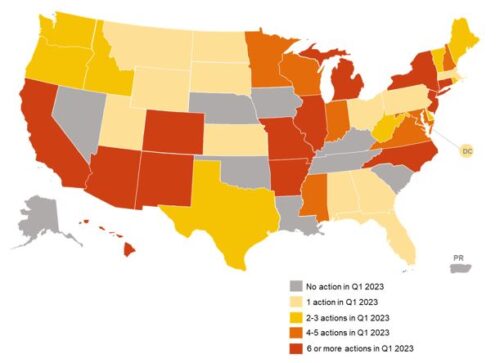The N.C. Clean Energy Technology Center (NCCETC) released its Q1 2023 edition of “The 50 States of Solar.” The quarterly series provides insights on state regulatory and legislative discussions and actions on distributed solar policy, with a focus on net metering, distributed solar valuation, community solar, residential fixed charges, residential demand and solar charges, third-party ownership and utility-led rooftop solar programs.
The report finds that 41 states plus the District of Columbia took some type of distributed solar policy action during Q1 2023, with the greatest number of actions continuing to address net-metering policies (59), community solar policies (45), and residential fixed charge or minimum bill increases (34). A total of 173 distributed solar policy actions were taken during Q1 2023, with the most actions taken in Connecticut, New Mexico, New York, North Carolina, Arkansas, California, Michigan, Missouri and Hawaii.

Q1 2023 Policy Action on Net Metering, Rate Design and Solar Ownership
The report identifies three trends in solar policy activity taken in Q1 2023: (1) basing net-metering successor compensation on time-varying and/or avoided cost rates, (2) addressing community solar project siting in program design, and (3) increasing low- to moderate-income customer participation requirements for community solar programs.
“A pair of net metering decisions in North Carolina and Indiana demonstrate the increasing trend of policymakers trying to better align compensation structures with the value to the grid,” noted Brian Lips, senior policy project manager at NCCETC.
The report notes the top five distributed solar policy actions of Q1 2023:
- Arkansas lawmakers enacting net-metering reform legislation;
- North Carolina regulators approving a net-metering successor tariff for Duke Energy;
- The Arizona Corporation Commission adopting a community solar policy framework;
- The Indiana Supreme Court upholding a net-metering successor tariff utilizing instantaneous netting; and
- Wisconsin regulators allowing a third-party owned solar project to advance.
“Low- and Moderate-Income (LMI) provisions were a significant part of community solar policy actions this quarter. New options exclusively for LMI customers or adders to ensure they receive tangible benefits have been proposed in several states,” said Vincent Potter, policy analyst at NCCETC, “All of the approved pilot projects in New Jersey’s community solar pilot program had at least 51% LMI participation. The draft rules for the permanent program would require that for all community solar facilities in the state.”
News item from the N.C. Clean Energy Technology Center



